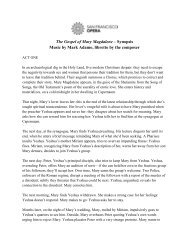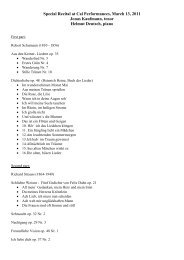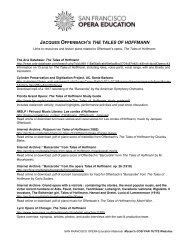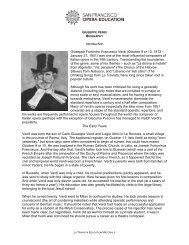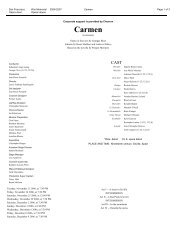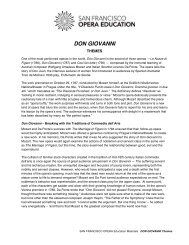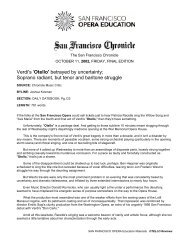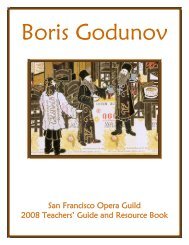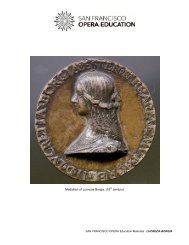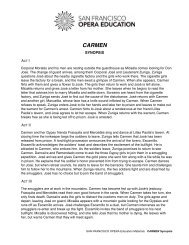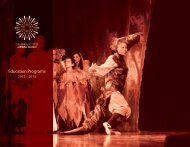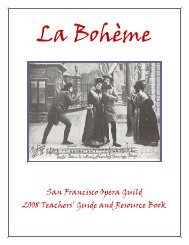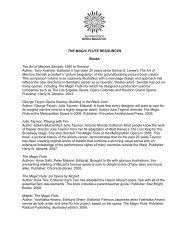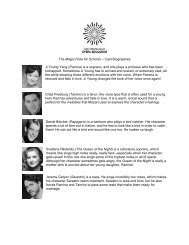The Rake's Progress Teachers Guide - San Francisco Opera
The Rake's Progress Teachers Guide - San Francisco Opera
The Rake's Progress Teachers Guide - San Francisco Opera
You also want an ePaper? Increase the reach of your titles
YUMPU automatically turns print PDFs into web optimized ePapers that Google loves.
W.H. Auden<br />
Wystan Hugh Auden (21 February 1907 – 29 September 1973) who signed his works W. H.<br />
Auden, was an Anglo-American poet, regarded by many as one of the greatest writers of<br />
the 20th century. His work is noted for its stylistic and technical achievements, its<br />
engagement with moral and political issues, and its variety of tone, form, and content. <strong>The</strong><br />
central themes of his poetry are: personal love, politics and citizenship, religion and morals,<br />
and the relationship between unique human beings and the anonymous, impersonal world<br />
of nature.<br />
Auden grew up in Birmingham in a professional middle-class family and read English<br />
Literature at Oxford. His early poems, in the late 1920s and 1930s, alternated between<br />
obscure modern styles and accessible traditional ones, were written in an intense and<br />
dramatic tone, and established his reputation as a left-wing political poet and prophet. He<br />
became uncomfortable in this role in the later 1930s, and abandoned it after he moved to<br />
the United States in 1939. His poems in the 1940s explored religious and ethical themes in<br />
a less dramatic manner than his earlier works, but still combined new forms devised by<br />
Auden himself with traditional forms and styles. In the 1950s and 1960s many of his poems<br />
focused on the ways in which words revealed and concealed emotions, and he took a<br />
particular interest in writing opera librettos, a form ideally suited to direct expression of<br />
strong feelings.<br />
He was also a prolific writer of prose essays and reviews on literary, political, psychological,<br />
and religious subjects, and he worked at various times on documentary films, poetic plays,<br />
and other forms of performance. Throughout his career he was both controversial and<br />
influential. After his death, some of his poems, notably "Funeral Blues" ("Stop all the<br />
clocks") and "September 1, 1939", became widely known through films, broadcasts, and<br />
popular media.<br />
Auden published about four hundred poems, including seven long poems (two of them<br />
book-length). His poetry was encyclopedic in scope and method, ranging in style from<br />
obscure twentieth-century modernism to the lucid traditional forms such as ballads and<br />
limericks, from doggerel through haiku and villanelles to a "Christmas Oratorio" and a<br />
baroque eclogue in Anglo-Saxon meters. <strong>The</strong> tone and content of his poems ranged from<br />
pop-song clichés to complex philosophical meditations, from the corns on his toes to atoms<br />
and stars, from contemporary crises to the evolution of society.<br />
21



